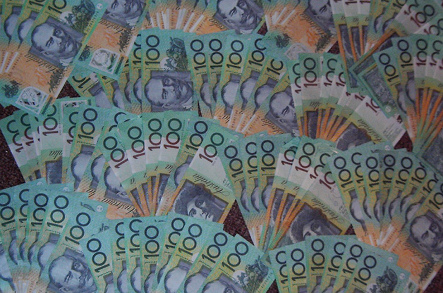In three hours I will be rich.
In five hours I can only eat out once a month.
In thirteen hours I can buy myself an apartment with cash up front.
But right now, this very moment, I'm nearly facing foreclosure on my home.
Over the next twenty-four hours nothing significant will have changed in my life. The only difference will be that I've arrived in a different country, a new time zone.
Global travel has revealed the relativity of worth, value and wealth. I know I speak from a privileged position, as someone who has reaped many of globalization's benefits. Most people can't just hop on an airplane and zip off to a far away destination. Certainly, the world faces serious problems: poverty, dislocation and starvation. But, when I have a chance to reflect upon it, my own experience as a frequent traveler says something remarkable about the 21st century economy.
I am a funky, fringe, white American urbanite, barely hanging onto my status as a middle class creative arts professional. In my home country of Brooklyn I have adapted myself to the considerable economic restrictions that come with my trade. Cabs are taken rarely, only for airports, and my car is 16 years old. I survive on thrift store expeditions and lots of Craig's List forays.
But this native New Yorker has spent much of the past few years living in the artist villages that surround the outer rings of Beijing, China. Before that, in the '90s, it was Latin America. Before that, Europe. So, at different times in my life, I've been able to take cabs every day (China), or, conversely, barely afford acoffee (London). Always pragmatic, I have outsourced my heath care to the most modernized, lowest cost places I could find (Argentina, Mexico, and I'm now looking at India). None of this is news to anyone who has taken a vacation.
What has not changed under any of these circumstances is who I am and what I aspire to. My values, spirituality and outlook remain the same — simple living, remaking and reusing most things, taking public transportation if available, eating vegetarian, abstaining from luxury or brand name items (at least on a first-pass basis, though I don't mind quality if a pricey dress is second hand). Yes, I have a laptop computer, but my TV is only 13 inches wide and used. I dumpster dive when I have money and I dumpster dive when I don't. No difference. I have earned $100,000 a year and I have earned nothing.
The cause of this discrepancy in my material circumstances is simply one thing: money. Be it pesos, euros, RMB or dollars. It is various colored pieces of paper with intricate layered graphics issued and handled by hordes of international monetary traders who set my worth relative to where I stand on the planet at any given instant. The value of that paper, as everyone knows, can fluctuate tremendously.
In China, I am perceived as a wealthy westerner — no questions asked. That perception gains me entrée to the highest levels of society. I lunch with millionaires, powerbrokers, diplomats and even representatives to the People's Party Congress. I get access to high levels that, in my own country, are far from staples of my daily life. It's easy to say this access comes from being a foreigner, but that's not entirely true. It is also because of my perceived monetary value.
I am poor in Dubai and London, but I can be middle class or even rich elsewhere, depending on the location of the tarmac where my plane lands. What does this say about the value of money and personal worth? It's not that money is not real, and it's not that money doesn't make a difference. But it does suggest that money is highly perceptual. The way that subjective perception determines value is skewed. I admit that I get skewed by it myself (especially when money is short).
To stretch the analogy, suppose you bought a new BMW. The second you purchase it, its value drops, even if you drive only twenty miles for just one week. In real terms, as the supposed "newest" model, the car is probably just as good as it was the week before, but its perceived worth has altered considerably because of a little dirt on the tires.
To be wealthy is certainly an enviable position, or at least to be perceived as wealthy. Aside from providing material possessions, wealth gives you access, mobility, respect and opportunity. These are the things that enable you to develop potential and enjoy the "better" things in life, which is far more important to me than accumulating lots of expensive stuff. But a lack of money has a way of effecting where you can go, who returns your phone call, what people think of you.
Another way to consider this issue of worth is from a Buddhist perspective. Any phenomenon experienced is experienced only in the mind. The fact that things change is proof that they are transient and not as real as they appear. For instance, if pleasure truly existed it could never change into pain. You would experience non-stop pleasure. The truth is you cannot hold onto change. But where do experiences really originate? They emanate from your mind.
The mind is powerful. For example, if you imagine or dream that you are burning in a fire, you might break out in a real sweat, even though no actual fire is burning. Buddhists say there is no object and no perceiver of the object, that it is the mind which makes things solid. (Though believing in an objective reality is certainly helpful when you look both ways to cross the street.) But as soon as you imagine the idea of flames, then you name it: fire. Names, in fact, are also imaginary. Think about all the languages in the world with their own words for "fire". What you are actually doing is connecting a sound or guttural utterance to a non-existent image according to a set of strange, grammatical rules. That is an issue of perception. And so is money.
Value arises from consensus. In China, the cold green translucent stone called jade is highly valued. The deeper green it is, the more expensive it gets. I personally think jade is an ugly polished stone. For me, it holds no value. Yet this view is at odds with an entire nation and 5000 years of its history. That is what I mean by perceived value. I am not talking about the next hot meal on the table, which is necessary for survival.
The current economic crisis is also about perceived value, especially when you consider that what got us into this mess was banks betting on the purely speculative value of imaginary future assets called CDMOs. That formerly illegal speculation, made legal by Congress again in 2000, allowed the trading of concrete assets (homes) for imaginary scenarios based on vague future predictions. This mass hallucination led to crippling consequences. It sprang from perceived, imaginary value.
Now SUVs are out. Credit card debt is out. Spending beyond your means is out. Living on borrowed funds is out. Acquiring what you can't afford is out. Recycling plastic bags and carrying fiber or woven shopping bags are in. Because of rapid globalization I can clearly see my relative worth radically shift in the blink of an eye. I see it when I land in a foreign country. I see it in my own neighborhood.
In three hours I will be rich.
In five hours I can only eat out once a month.
In thirteen hours I can buy myself an apartment with cash up front.
But right now, this very moment, I'm nearly facing foreclosure on my home.
Which one of thesescenarios is real?
Image by Maestro_AU, courtesy of Creative Commons license.













